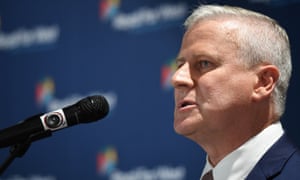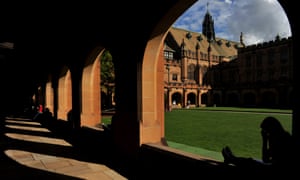Extract from The Guardian
Nationals leader Michael McCormack vows to ‘fight’ any proposed changes that could disadvantage regional students
Labor and the university sector have blasted a push by a Liberal
senator to scrap tertiary student amenity fees, while the deputy prime
minister has warned the Nationals will prevent any move that hurts
regional universities.
In December the Liberal senator James McGrath quietly gave notice in the Senate that when parliament returns in February he will introduce a bill to prevent higher education providers charging a mandatory student services and amenities fee, the last vestige of compulsory student unionism.
Tertiary education institutions raise more than $100m a year by charging students a fee of up to $303 which they then distribute to bodies such as student representative councils, student unions and sports clubs.
Although McGrath’s is a private senator’s bill, the fresh push could spark tension in the Coalition between Liberals, who have have consistently opposed amenities fees, and the Nationals.In December the Liberal senator James McGrath quietly gave notice in the Senate that when parliament returns in February he will introduce a bill to prevent higher education providers charging a mandatory student services and amenities fee, the last vestige of compulsory student unionism.
Tertiary education institutions raise more than $100m a year by charging students a fee of up to $303 which they then distribute to bodies such as student representative councils, student unions and sports clubs.
The acting education minister, Simon Birmingham, and the deputy prime minister, Michael McCormack, both distanced themselves from McGrath’s position, noting the “proposed legislation is a private member’s bill”.

The Universities Australia chief executive, Catriona Jackson, urged McGrath to reconsider, arguing that universities – especially in regional Australia - would “want common sense to prevail”.
“These fees fund crucial student services across the country including medical and counselling facilities, online and in-person study support to help students at risk of dropping out, and crucial student career preparation and advice services,” she said.
“They also fund essential sports, recreation and cultural facilities and events that foster campus life.”
Labor’s education spokeswoman, Tanya Plibersek, told Guardian Australia: “It’s time for the Liberals to grow up – they think they’re back in student politics.
“Labor believes students deserve good support services and representation at uni.”
National Union of Students’ outgoing president Mark Pace said the peak representative body is “very much against any attempt to cut or reduce [the student amenities fee]”.
He said the fee “provides vital services to Australia’s one million university students” including emergency loans, student welfare officers and free legal services such as tax help.
“The fee supports clubs and broader student life – it funds a wide range of facilities and student representation, because students have a right to quality, equitable and accessible education.”
Higher education is set to be one of the key battlegrounds of the 2019 election, after Labor promised to reverse cuts to universities worth more than $2bn.
The Morrison government has also announced a review of freedom of speech on Australian campuses lead by former high court chief justice Robert French and is considering how to introduce performance funding for universities.
The Howard government abolished compulsory student unionism in 2005 despite the opposition of then senator Barnaby Joyce, but it was partially revived in 2011 by the Gillard government in the form of amenities fees.
In 2013 Tony Abbott was forced to shelve a plan to abolish the fee in part due to public criticism from Nationals MP Michael McCormack.
In October 2017 the Young Liberals cheered government senators for joining Cory Bernardi in backing an unsuccessful Senate motion criticising the fee.
“From day one, the Young Liberal movement has opposed this student tax and been leading the charge in advocating for its repeal,” then federal president Aiden Depiazzi said.

No comments:
Post a Comment